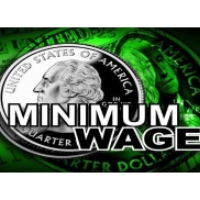L.A. Votes to Gradually Raise the Minimum Wage to $15 by 2020

Los Angeles is not the first city in the nation, or California for that matter, to substantially raise its minimum wage, but it could arguably have the biggest effect—good or bad.
The City Council voted 14-1 Tuesday to raise the $9-an-hour floor to $15 by 2020 over the strenuous objections of the business community. They argued that small businesses would be hit the hardest, commerce would flee the city or the suburbs and beyond, and L.A. would become a “wage island.” The council’s sole Republican, Mitchell Englander, cast the “no” vote.
It has been a foregone conclusion for months that Los Angeles was going to join a growing national movement, pushed hard by the Democratic Party, to dramatically boost the minimum wage. “We're setting a bar for the rest of the nation to follow,” Councilman Paul Krekorian said.
“That’s a monumental change in wages,” Jerry Newman, a professor at the State University of New York at Buffalo School of Management, told the Los Angeles Times. “It’s going to have both an economic impact and a social impact.”
California raised its minimum wage to $9 an hour, effective last July, and it is scheduled to rise again to $10.10 in January 2016. The U.S. minimum wage is $7.25 and hasn’t changed in five years. Twenty-one states raised their minimum wage levels as of the beginning of this year.
Los Angeles will phase in the wage increase, starting with a rise to $10.50 in July 2016. It goes to $12 in 2017, $13.25 in 2018 and $14.25 in 2019. These will all be meaningful increases as long as the country avoids inflation. The country has been flirting with deflation since the Great Recession, which has worked out wonderfully for the 1%.
The national minimum wage peaked in the late 1960s, when adjusted for inflation. Although the wage was $1.60 an hour in 1968, that would be the equivalent of $9.25 today. Workers have lost ground on wages even as productivity has skyrocketed. If the minimum wage were pegged to overall income growth in the American economy, the minimum wage would be $21.16 an hour.
A wage that high might slow the disintegration of the middle class, reduce the portfolios of the burgeoning millionaire/billionaire class and address the growing problem of income inequality if it were the law of the land now. It remains to be seen what effect, beyond helping draw distinct political battle lines for the 2016 election, its gradual, piecemeal elevation toward a close proximity of a living wage will have on the distribution of financial resources in the country.
The Los Angeles ordinance received some of its stiffest resistance from the restaurant industry, where some of the city’s poorest workers toil. They would like workers to forego tips in exchange for the higher wage, but that’s not going to happen. The council is considering some sort of compensation for restaurateurs and might look at allowing a service charge on bills to cover the expenses.
One measure that won’t be in the ordinance is a requirement that employers provide 12 days of paid leave annually. That idea got a favorable reception by a council committee, but business community outrage put that one on a back burner.
–Ken Broder
To Learn More:
L.A. City Council Approves $15 Minimum Wage by 2020 (by Gene Maddaus, LA Weekly)
Los Angeles Lifts Its Minimum Wage to $15 Per Hour (by Jennifer Medina and Noam Scheiber, New York Times)
Minimum Wage: L.A. City Council Approves Increase to $15 by 2020 (by Peter Jamison, David Zahniser and Alice Walton, Los Angeles Times)
Rep. McClintock Argues Minimum Wage Needs to Be Low for “Minorities” (by Ken Broder, AllGov California)
- Top Stories
- Controversies
- Where is the Money Going?
- California and the Nation
- Appointments and Resignations
- Unusual News
- Latest News
- California Forbids U.S. Immigration Agents from Pretending to be Police
- California Lawmakers Urged to Strip “Self-Dealing” Tax Board of Its Duties
- Big Oil’s Grip on California
- Santa Cruz Police See Homeland Security Betrayal in Use of Gang Roundup as Cover for Immigration Raid
- Oil Companies Face Deadline to Stop Polluting California Groundwater





